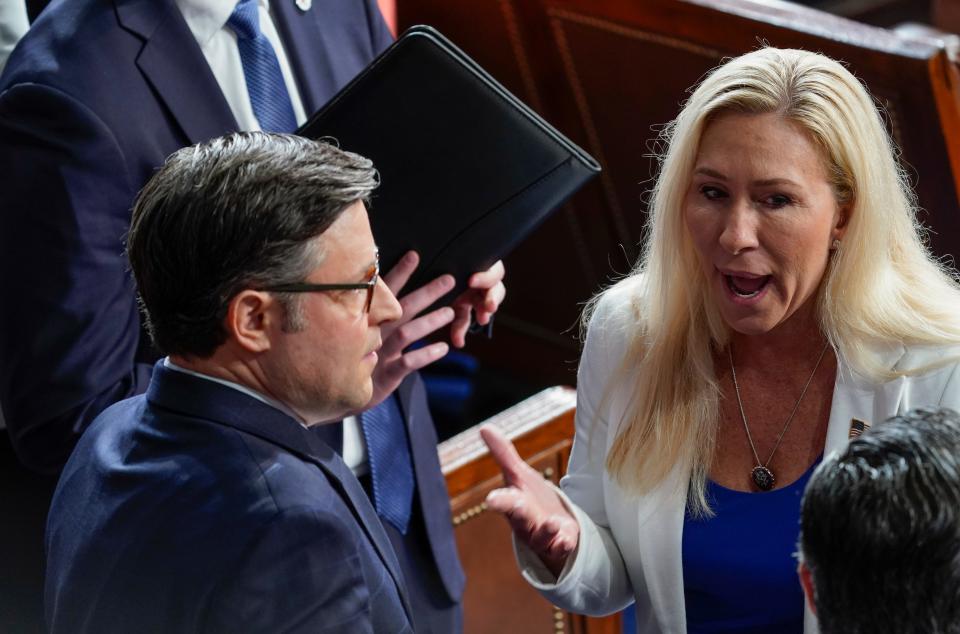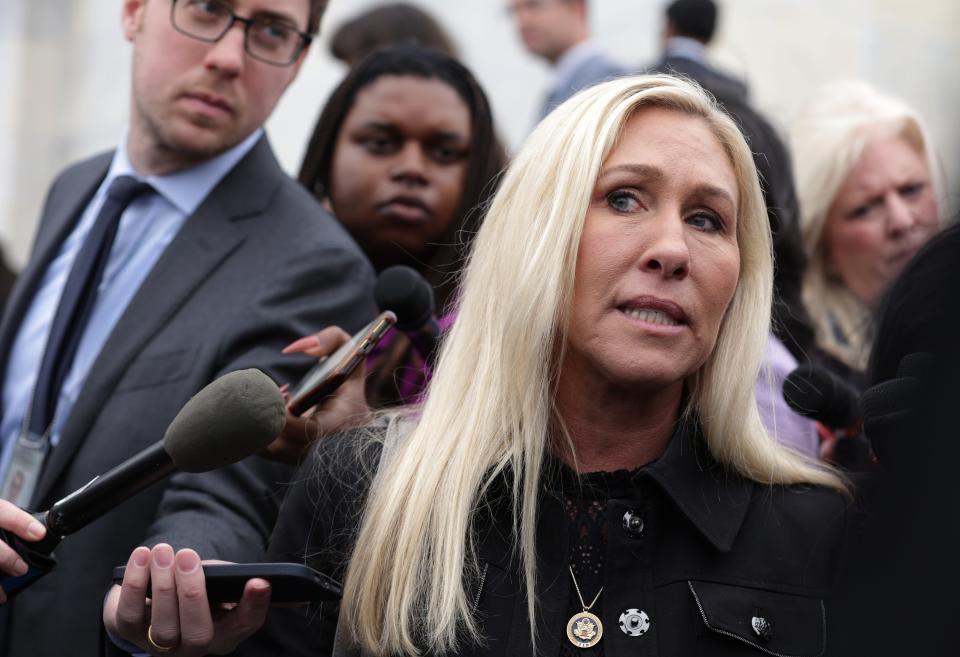Marjorie Taylor Greene doesn't want to help Ukraine. That's exactly what Russia wants.
Can America secure our southern border to stem an immigration crisis while also helping Ukraine fight off a prolonged invasion from Russia?
There are some very vocal Republicans in Congress who say no. They want to focus only on the border, while watching Russia consume Ukraine.
That's just how Russia wants it.
Those Republicans, like Rep. Marjorie Taylor Greene of Georgia, have played right into Russia's plan to sow division in our country by pitting the border against Ukraine.
She has repeatedly threatened to unseat Mike Johnson, the rookie Republican speaker of the House from Louisiana, as he tries to push forward more military aid for Ukraine that has significant bipartisan support.
Vladimir Putin, Russia's president, must find all this congressional chaos so gratifying.
Russian propaganda has reached American leadership

We're watching the Russian information war playbook roll out on social media platforms and into the halls of Congress.
That's not just me talking.
Rep. Michael McCaul, the Texas Republican who chairs the House Foreign Affairs Committee, told Puck in an interview last week that "Russian propaganda has made its way into the United States, unfortunately, and it's infected a good chunk of my party's base."
Rep. Michael Turner, the Ohio Republican who chairs the House Intelligence Committee, agreed with McCaul during a CNN interview Sunday: "We see, directly coming from Russia, attempts to mask communications that are anti-Ukraine and pro-Russia messages – some of which we even hear being uttered on the House floor."
McCaul and Turner didn't name names. They didn't have to. Turn on any cable news network. You'll see who they were talking about.
American politics made it easy for disinformation to take hold
Kyle Walter noticed a spike in mid-January in Russian messaging about America's southern border on platforms like Telegram and VK.
Walter, who works for Logically, a tech firm that analyzes disinformation, said those networks zeroed in on a dispute between Texas Gov. Greg Abbott, who erected barriers with razor wire along the border, and the Biden administration, which said that made it difficult for Border Patrol agents to do their jobs.
"These Russian channels lit up overnight and started talking about the potential for Texas to secede from the union for the potential for a civil war," Walter said.
Nothing like a little civil war to distract us all from Ukraine's plight.
That Russian-language messaging then moved over as English-language posts on Facebook and X, with the same sentence structures and rhetoric. Those accounts signal-boosted each other with reposts and engagement.
Who will be Trump's VP? Trump asks supporters to help pick his running mate. He really just wants their money.
X, formerly known as Twitter, appears to be the favorite forum for all that, Walter said, because that platform has pulled back from content moderation meant to regulate disinformation.
"Russian disinformation has pervaded every level of American society at this point," he said. "It's not surprising to see people at very high levels of the government sharing similar messaging to Russia messaging on this topic just because it's become so ingrained in our regular discourse."
Marjorie Taylor Greene's letter reads as if it were ripped out of Putin's playbook

Greene took the first legislative steps to oust Johnson as speaker last month and upped the ante in a five-page letter to House colleagues Tuesday. Page 2 included an accusation that a recent spending bill pushed by Johnson "did nothing to stop Biden's deadly border invasion."
Page 3 said Republicans "could have at least secured the border," an odd claim since former President Donald Trump's Republican allies in Congress like Johnson and Greene in February helped blow up a bipartisan Senate deal to do just that.
She closed with a pair of paragraphs that sounded like dictation she took from Putin, linking the border and immigration directly to the pending $60 billion in aid to Ukraine that has been in limbo since the Senate approved it in February.
Biden and Trump have issues: But Biden has the cash to fix his problems.
"The American people disagree – they believe our border is the only border worth fighting a war over," Greene wrote.
I wonder if that sounded more credible in the original Russian?
Are Americans still concerned about the war in Ukraine?
Public sentiment on this is not as clear-cut as Greene cast it. This can be ripe for the Russians to sow division because Americans are already divided about it along partisan political lines.
Last month, the State Department reported that we sent more than $47 billion in military assistance to Ukraine from 2014 to 2022 to deal with Russia's annexation of Crimea and $44.2 billion since the full-scale invasion on Feb. 24, 2022.
The Defense Department has carefully spelled out how much of that money actually goes to American contractors, impacting jobs and the economy here.

In an AP/NORC poll released two years after the Russian invasion, 60% of Americans said our spending on aid for Ukraine was "about right" or "too little," while 37% called it "too much."
Broken out by party, 55% of Republicans said we're spending too much; 38% of Democrats said the spending was about right and 44% said it was too little.
The poll also found that 58% of Democrats considered providing aide to Ukraine very important and 30% said it's somewhat important, while 24% of Republicans saw that as very important and 38% called it somewhat important.
In a February Pew Research Center survey, 3 out of 4 Americans found the war in Ukraine to be important to U.S. interests. Again, there was a Democratic-Republican split of 81% to 69% feeling that way.
So plenty of Americans feel concern and even an obligation about Ukraine.
Russia was there in 2016 and never left
Some of you will read this and cry "Russia, Russia, Russia," Trump's mocking refrain for the investigations into that country's interference in our 2016 presidential election.
Opinion alerts: Get columns from your favorite columnists + expert analysis on top issues, delivered straight to your device through the USA TODAY app. Don't have the app? Download it for free from your app store.
It's worth a reminder that a Senate Intelligence Committee investigation – conducted during Trump's lone term as president while Republicans controlled the Senate – released a report in 2019 that said Russian-directed social media was used in the 2016 election "as part of a broader, sophisticated, and ongoing information warfare campaign designed to sow discord in American politics and society."
Richard Burr, the North Carolina Republican who chaired that committee, warned that "Russia is waging an information warfare campaign against the U.S. that didn’t start and didn’t end with the 2016 election."
He was right. It's still at it. Russia has plenty of motivation to again meddle in our presidential election.
President Joe Biden, understanding the threats posed by Russia, wants to help Ukraine win the war. Trump's plan for peace between the two countries, according to The Washington Post, is to force Ukraine to forever surrender territory to Russia.
Greene met with Johnson on Wednesday and came away with no deal. The House speaker predicted "chaos" if she tries to oust him.
The Russians can only hope she sticks to their playbook.
Follow USA TODAY elections columnist Chris Brennan on X, formerly known as Twitter: @ByChrisBrennan
You can read diverse opinions from our Board of Contributors and other writers on the Opinion front page, on Twitter @usatodayopinion and in our daily Opinion newsletter.
This article originally appeared on USA TODAY: Trump Republicans want to end aid to Ukraine, just like Putin wants
